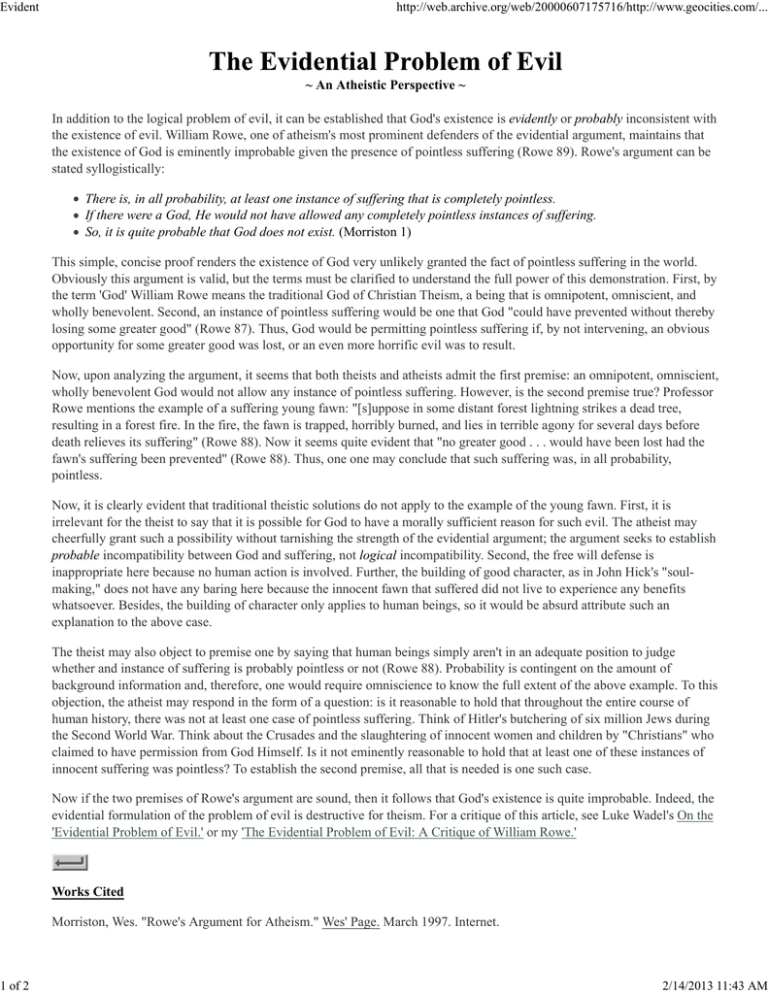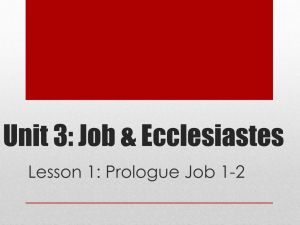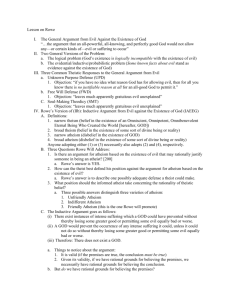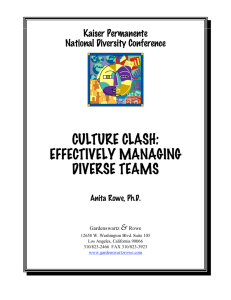~ An Atheistic Perspective ~
advertisement

Evident 1 of 2 http://web.archive.org/web/20000607175716/http://www.geocities.com/... ~ An Atheistic Perspective ~ In addition to the logical problem of evil, it can be established that God's existence is evidently or probably inconsistent with the existence of evil. William Rowe, one of atheism's most prominent defenders of the evidential argument, maintains that the existence of God is eminently improbable given the presence of pointless suffering (Rowe 89). Rowe's argument can be stated syllogistically: There is, in all probability, at least one instance of suffering that is completely pointless. If there were a God, He would not have allowed any completely pointless instances of suffering. So, it is quite probable that God does not exist. (Morriston 1) This simple, concise proof renders the existence of God very unlikely granted the fact of pointless suffering in the world. Obviously this argument is valid, but the terms must be clarified to understand the full power of this demonstration. First, by the term 'God' William Rowe means the traditional God of Christian Theism, a being that is omnipotent, omniscient, and wholly benevolent. Second, an instance of pointless suffering would be one that God "could have prevented without thereby losing some greater good" (Rowe 87). Thus, God would be permitting pointless suffering if, by not intervening, an obvious opportunity for some greater good was lost, or an even more horrific evil was to result. Now, upon analyzing the argument, it seems that both theists and atheists admit the first premise: an omnipotent, omniscient, wholly benevolent God would not allow any instance of pointless suffering. However, is the second premise true? Professor Rowe mentions the example of a suffering young fawn: "[s]uppose in some distant forest lightning strikes a dead tree, resulting in a forest fire. In the fire, the fawn is trapped, horribly burned, and lies in terrible agony for several days before death relieves its suffering" (Rowe 88). Now it seems quite evident that "no greater good . . . would have been lost had the fawn's suffering been prevented" (Rowe 88). Thus, one one may conclude that such suffering was, in all probability, pointless. Now, it is clearly evident that traditional theistic solutions do not apply to the example of the young fawn. First, it is irrelevant for the theist to say that it is possible for God to have a morally sufficient reason for such evil. The atheist may cheerfully grant such a possibility without tarnishing the strength of the evidential argument; the argument seeks to establish probable incompatibility between God and suffering, not logical incompatibility. Second, the free will defense is inappropriate here because no human action is involved. Further, the building of good character, as in John Hick's "soulmaking," does not have any baring here because the innocent fawn that suffered did not live to experience any benefits whatsoever. Besides, the building of character only applies to human beings, so it would be absurd attribute such an explanation to the above case. The theist may also object to premise one by saying that human beings simply aren't in an adequate position to judge whether and instance of suffering is probably pointless or not (Rowe 88). Probability is contingent on the amount of background information and, therefore, one would require omniscience to know the full extent of the above example. To this objection, the atheist may respond in the form of a question: is it reasonable to hold that throughout the entire course of human history, there was not at least one case of pointless suffering. Think of Hitler's butchering of six million Jews during the Second World War. Think about the Crusades and the slaughtering of innocent women and children by "Christians" who claimed to have permission from God Himself. Is it not eminently reasonable to hold that at least one of these instances of innocent suffering was pointless? To establish the second premise, all that is needed is one such case. Now if the two premises of Rowe's argument are sound, then it follows that God's existence is quite improbable. Indeed, the evidential formulation of the problem of evil is destructive for theism. For a critique of this article, see Luke Wadel's On the 'Evidential Problem of Evil.' or my 'The Evidential Problem of Evil: A Critique of William Rowe.' Works Cited Morriston, Wes. "Rowe's Argument for Atheism." Wes' Page. March 1997. Internet. 2/14/2013 11:43 AM Evident 2 of 2 http://web.archive.org/web/20000607175716/http://www.geocities.com/... World Wide Web: http://stripe.colorado.edu/~morristo/rowe.html (8 March 1997) Rowe, William L. Philosophy of Religion. California: Dickenson Publishing Company, Inc., 1978. © Copyright 1997, Thomas Rauchenstein. Written permission of the author is required for copying, electronically or otherwise. 2/14/2013 11:43 AM






